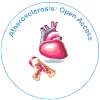当社グループは 3,000 以上の世界的なカンファレンスシリーズ 米国、ヨーロッパ、世界中で毎年イベントが開催されます。 1,000 のより科学的な学会からの支援を受けたアジア および 700 以上の オープン アクセスを発行ジャーナルには 50,000 人以上の著名人が掲載されており、科学者が編集委員として名高い
。オープンアクセスジャーナルはより多くの読者と引用を獲得
700 ジャーナル と 15,000,000 人の読者 各ジャーナルは 25,000 人以上の読者を獲得
インデックス付き
- Google スカラー
- レフシーク
- ハムダード大学
- エブスコ アリゾナ州
- パブロン
- ICMJE
役立つリンク
オープンアクセスジャーナル
このページをシェアする
抽象的な
Inflammation and Immunological Responses in Atherosclerosis: Origins and Therapeutic Targets for Innovative Cardiovascular Disease (CVD) Therapies
Glory Coppe
This study focuses on atherosclerosis, a prominent cause of cardiovascular disease (CVD). Atherosclerosis is a chronic inflammatory disorder characterised by immunological competent cells in lesions that primarily generate proinflammatory cytokines. The presence of dead cells and oxidised versions of low density lipoproteins (oxLDL) is significant in this syndrome. The rupture of atherosclerotic plaques is the main cause of CVD. At larger concentrations, oxLDL has features that promote inflammation and immunological activation, causing cell death. It also includes inflammatory phospholipids, notably phosphorylcholine (PC), which is an intriguing epitope. Antibodies that target PC (anti-PC) may have atheroprotective benefits, possibly due to their anti-inflammatory qualities. While the participation of bacteria and viruses in atherosclerosis has been discussed, direct proof has been difficult to come by, and antibiotic studies have failed. Heat shock proteins have the potential to be targets for atherogenic immune responses. Pro-inflammatory cytokines, chemokines, and lipid mediators are other contributors in plaque rupture. To establish inflammation as a cause of atherosclerosis and CVD, clinical trials using anti-inflammatory and immune-modulatory therapy are required. This review investigates the possible origins of immunological responses and inflammation in atherosclerosis, as well as therapeutic techniques that target inflammation for innovative CVD therapies.

 English
English  Spanish
Spanish  Chinese
Chinese  Russian
Russian  German
German  French
French  Portuguese
Portuguese  Hindi
Hindi